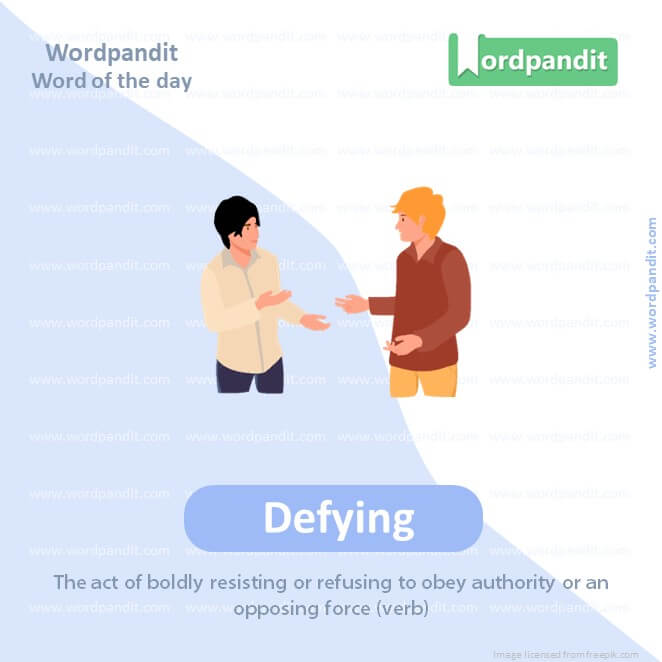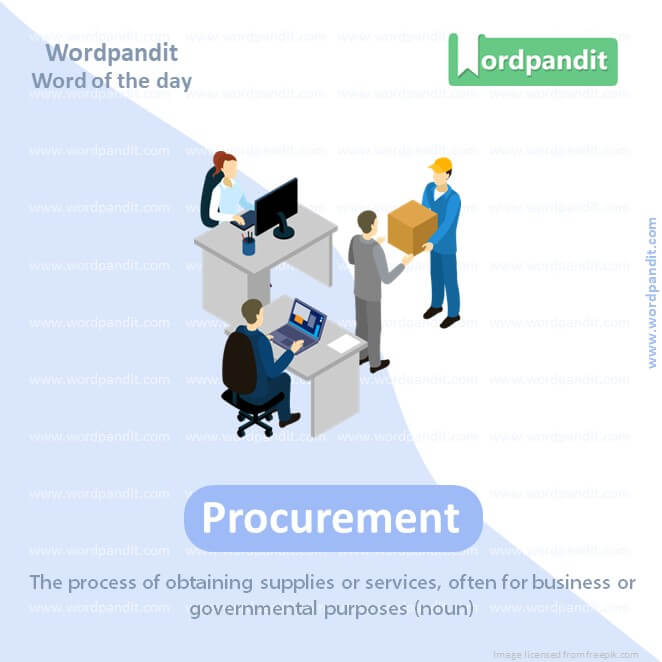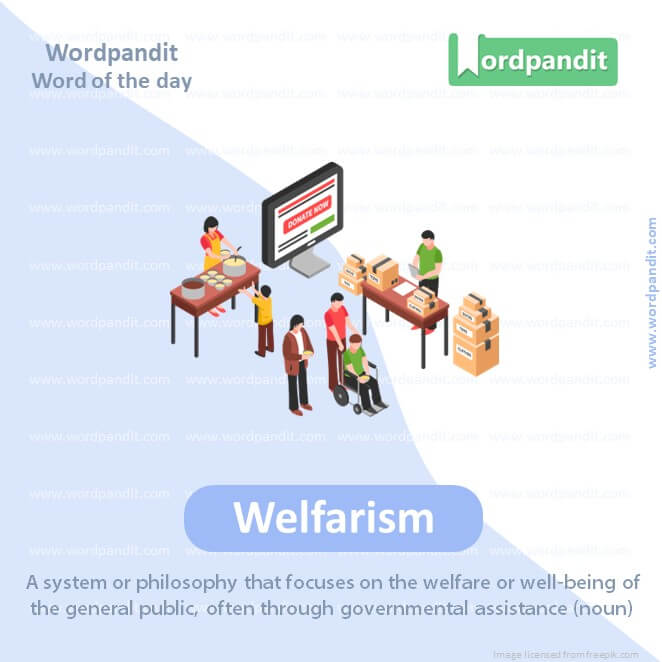Daily Vocabulary Words: List of Daily Used Words in Leading Indian Newspapers
Hi there. Welcome to this special section @ Wordpandit. Our endeavour here is straightforward: highlighting daily vocabulary words that you would come across in leading newspapers in the country. We have included the following newspapers in our selection:
• The Times of India
• The Economic Times
• Hindustan Times
• Mint
• Indian Express
We are putting in extensive work to develop your vocabulary. All you have to do is be regular with this section and check out this post daily. This is your repository of commonly used words; essentially, we are posting a list of daily used words. Hence, this has significant practical application as it teaches you words that are commonly used in leading publications mentioned above.
Visit the website daily to learn words from leading Indian newspapers.

WORD-1: Defying
CONTEXT: The Bharatiya Janata Party’s emphatic Assembly elections win defying earlier predictions.
SOURCE: Indian Express
EXPLANATORY PARAGRAPH: Imagine you have a rule at home that says you can’t have cookies before dinner, but you take a cookie anyway. That’s like defying, which means not doing what you’re told or expected to do, even if someone says it’s really important.
MEANING: The act of boldly resisting or refusing to obey authority or an opposing force (verb).
PRONUNCIATION: dee-fy-ing
SYNONYMS: Resisting, Challenging, Opposing, Disobeying, Contravening, Flouting
USAGE EXAMPLES:
1. The little boy was defying his mother’s orders by not going to bed on time.
2. Defying the odds, she became a champion despite many people doubting her.
3. The hero in the story was defying the villain to save the city.
4. She was defying tradition by choosing a career path very different from her family’s.
WORD-2: Desilting
CONTEXT: The focus on completing unfinished last-mile projects and improving utilization of existing irrigation potential, through concrete lining of canals and timely desilting, cleaning and fixing breaches before the cropping season.
SOURCE: Indian Express
EXPLANATORY PARAGRAPH: Desilting is like cleaning out the dirt and mud that gets stuck at the bottom of rivers or lakes. It’s done to make sure the water can flow smoothly and the river or lake stays healthy and not too muddy.
MEANING: The process of removing silt, mud, or other material from the bottom of bodies of water (verb).
PRONUNCIATION: dee-silt-ing
SYNONYMS: Dredging, Clearing, Cleaning, Purging, Excavating
USAGE EXAMPLES:
1. The workers were busy desilting the canal to prevent flooding.
2. Desilting the pond helped restore its natural beauty and health.
3. A major desilting project was undertaken to improve water flow in the river.
4. Regular desilting is necessary to maintain the depth of harbors.

WORD-3: Procurement
CONTEXT: The procurement centers were set up even outside the primary APMC (agricultural produce market committee) yards — in sub-mandis, cooperative societies and warehouses closer to the villages.
SOURCE: Indian Express
EXPLANATORY PARAGRAPH: Procurement is like when you go to a store to buy things you need, like toys or clothes. But instead of toys, it’s for a company or a big group of people, and they’re buying things like computers, paper, or anything they need to work.
MEANING: The process of obtaining supplies or services, often for business or governmental purposes (noun).
PRONUNCIATION: pro-cure-ment
SYNONYMS: Acquisition, Purchasing, Buying, Obtaining, Sourcing, Securing
USAGE EXAMPLES:
1. The company’s procurement team is responsible for buying all the office supplies.
2. Efficient procurement is key to managing a business’s expenses.
3. The government opened a tender for the procurement of new computers.
4. Procurement policies ensure fair and ethical buying practices.
WORD-4: Predominantly
CONTEXT: Scores of people from predominantly farming communities such as Kamma, Naidu, Reddy, Raju, Gounder, Patidar, and Maratha have made the transition from prosperous agriculturalists to businessmen-industrialists.
SOURCE: Indian Express
EXPLANATORY PARAGRAPH: Predominantly is like when most of something is one way. Imagine a jar full of red and blue marbles, but most of them are red. That’s like saying the marbles are predominantly red, which means mostly red.
MEANING: Mainly or for the most part; primarily (adverb).
PRONUNCIATION: pre-dom-i-nant-ly
SYNONYMS: Mostly, Largely, Chiefly, Mainly, Primarily, Principally
USAGE EXAMPLES:
1. The class was predominantly made up of girls, with only a few boys.
2. The forest is predominantly pine trees, with a few oaks scattered around.
3. The audience was predominantly adults, although some children were present.
4. Her diet is predominantly vegetarian, with occasional fish dishes.

WORD-5: Scattered
CONTEXT: First as Punjab’s rehabilitation and development minister (1947-1956) and then as chief minister (1956-64), implemented land reforms through consolidation of fragmented and scattered holdings alongside imposition of a 12-hectare ceiling.
SOURCE: Indian Express
EXPLANATORY PARAGRAPH: Scattered is like when your toys are all over the room instead of in one place. Things that are scattered are spread out over a large area, not close together.
MEANING: Spread out over a wide area in a random way; not clustered together (verb, adjective).
PRONUNCIATION: scat-terd
SYNONYMS: Spread, Dispersed, Sprinkled, Strewn, Disseminated, Distributed
USAGE EXAMPLES:
1. After the party, toys were scattered all over the living room.
2. The stars looked like scattered diamonds in the night sky.
3. Scattered showers are expected throughout the afternoon.
4. The villagers are scattered across the countryside, living in small groups.

WORD-6: Diversifying
CONTEXT: Diversifying beyond agriculture is a challenge the next government in MP – whether under Chouhan or anybody else – has to address.
SOURCE: Hindustan Times
EXPLANATORY PARAGRAPH: Diversifying is like having different kinds of toys instead of just one type. It means making things varied or different, like having different types of games, books, and puzzles, so you have lots of different things to enjoy.
MEANING: The act of making or becoming more varied or different; introducing variety (verb).
PRONUNCIATION: di-ver-si-fy-ing
SYNONYMS: Varying, Expanding, Branching Out, Broadening, Mixing, Differentiating
USAGE EXAMPLES:
1. The company is diversifying its product range to attract more customers.
2. Diversifying investments can reduce the risk of losing money.
3. The farmer is diversifying his crops to include vegetables and fruits.
4. She’s diversifying her skills by learning new languages.

WORD-7: Welfarism
CONTEXT: This model of gender-based welfarism had yielded great benefits to Mamata Banerjee and the Trinamool Congress in West Bengal in 2021 and, arguably, was a factor in the Congress’s victory over the BJP in Karnataka.
SOURCE: Hindustan Times
EXPLANATORY PARAGRAPH: Welfarism is like when everyone in your class gets help and support to be happy and healthy. It’s about making sure people have what they need, like food and a safe place to live, especially those who need extra help.
MEANING: A system or philosophy that focuses on the welfare or well-being of the general public, often through governmental assistance (noun).
PRONUNCIATION: wel-fair-ism
SYNONYMS: Social Welfare, Public Assistance, Aid, Support, Charity, Benevolence
USAGE EXAMPLES:
1. The government’s welfarism policies aim to reduce poverty and inequality.
2. Critics argue that too much welfarism can make people dependent on the state.
3. The new reforms were introduced to strengthen the country’s welfarism.
4. Welfarism plays a crucial role in supporting the underprivileged sections of society.
WORD-8: Incumbent
CONTEXT: A direct cash transfer to women in the 23-60 age group implemented by the incumbent chief minister, Shivraj Singh Chouhan, that reached a huge majority of MP’s households.
SOURCE: Hindustan Times
EXPLANATORY PARAGRAPH: Incumbent is like being the current king or queen of a game. It means you’re the one who is holding an official position or role right now, like being the class monitor or the leader of a team.
MEANING: Currently holding a specified office or position (adjective); the holder of an office or position (noun).
PRONUNCIATION: in-cum-bent
SYNONYMS: Current, Present, Sitting, Reigning, Occupying, Holder
USAGE EXAMPLES:
1. It is incumbent upon the teacher to ensure all students understand the lesson.
2. The incumbent president is running for re-election.
3. She defeated the incumbent in a surprising election upset.
4. As the incumbent manager, he introduced several new policies.
WORD-9: Discernible
CONTEXT: The women’s vote, particularly among younger women, has turned into a discernible political identity.
SOURCE: Hindustan Times
EXPLANATORY PARAGRAPH: Discernible is like being able to tell the difference between two things. Imagine looking at two crayons, one red and one blue. You can see the difference between them easily. That’s what discernible means – something you can notice or see the difference in.
MEANING: Able to be seen, recognized, or understood; noticeable (adjective).
PRONUNCIATION: dis-cern-i-ble
SYNONYMS: Noticeable, Detectable, Perceptible, Visible, Observable, Apparent
USAGE EXAMPLES:
1. There was a discernible change in her mood after the good news.
2. The quality difference between the two products is easily discernible.
3. A discernible pattern emerged after studying the data.
4. His smile was barely discernible in the dim light.
WORD-10: Chronicled
CONTEXT: Anirvan Chowdhury, for instance, has chronicled how the BJP has mobilized female voters through female party activists engaged in seva (service).
SOURCE: Hindustan Times
EXPLANATORY PARAGRAPH: Chronicled is like writing down or drawing pictures of all the fun things you did, so you can remember them later. It means recording events or stories in the order they happened, like in a diary or a history book.
MEANING: Recorded or written down in the order of their occurrence; documented in detail (verb).
PRONUNCIATION: kron-i-kld
SYNONYMS: Recorded, Documented, Reported, Narrated, Logged, Registered
USAGE EXAMPLES:
1. The adventures of the explorers were chronicled in a series of books.
2. She chronicled her journey across Asia in her blog.
3. The history of the ancient kingdom was chronicled by scribes.
4. The newspaper chronicled the events leading up to the war.
Vocabulary Daily Words
Among the myriad aspects of language learning, the role of ‘vocabulary daily words’ attests to their undeniable importance. These everyday words form the bedrock of communication. Whether used in casual chat or formal discussion, the fluency and understanding of ‘vocabulary daily words’ can significantly uplift the quality of interaction. However, the vital question is, how to effectively learn these ‘vocabulary daily words’?
The crux of learning ‘vocabulary daily words’ lies in a well-rounded approach that encompasses exposure, understanding, memorization, and practice. Rote memorization might seem like a quick solution, but it lacks context and, thereby, retention. Hence, opt for a diverse range of resources like books, newspapers, podcasts, and digital media. These will bring ‘vocabulary daily words’ to life, providing real-life usage examples and making the learning process inherently engaging.
Next, using memory-enhancing techniques can significantly improve retention of ‘vocabulary daily words’. Techniques such as flashcards or the Leitner System align with the principles of spaced repetition, allowing more effective and long-term learning. Incorporating mnemonic devices, associating new words with unique stories or images, can further facilitate this learning process.
The key to fully grasping ‘vocabulary daily words’ lies in practical usage. Make it a habit to use these words in your daily communications. Whether it’s a friendly conversation, a professional email, or a social media post, try integrating these new words. Doing so provides hands-on practice, strengthening your comprehension and application of these words.
In a nutshell, ‘vocabulary daily words’ are a treasure in the language learning landscape. By harnessing diversified resources, utilizing memory techniques, and actively using these words, your grip on the ‘vocabulary daily words’ will strengthen significantly. So, turn the pages, hit play, start a conversation, and let these ‘vocabulary daily words’ shape the story of your linguistic journey.













